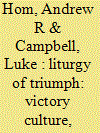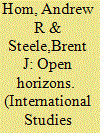|
|
|
Sort Order |
|
|
|
Items / Page
|
|
|
|
|
|
|
| Srl | Item |
| 1 |
ID:
144784


|
|
|
|
|
| Summary/Abstract |
Various reflections on the ‘Arab Spring’ evince a common view of the relationship between change and time that imbues events with a sense of intrinsic peril. Based on a framework developed from Norbert Elias’s concept of timing, this article elaborates the relationship between time and the ‘Arab Spring’ by unpacking and explaining three rhetorical tropes prevalent in academic responses to the revolts. The first two construct a problem to which the third proffers a solution. First, analysts treat time itself as a problematic force confounding stability and progress. Second, they deploy fluvial metaphors to present dynamic events as inherently insecure. Third, they use temporal Othering to retrofit the ‘Arab Spring’ to the familiar arc of liberal democracy, which renders the revolts intelligible and amenable to external intervention. These moves prioritize certainty and order over other considerations and constrain open-ended transformations within a familiar rubric of political progress. They also constitute an active timing effort based on a conservative standard, with important implications for our understanding of security and for scholarly reflexivity. The article concludes with three temporal alternatives for engaging novel changes like the ‘Arab Spring’.
|
|
|
|
|
|
|
|
|
|
|
|
|
|
|
|
| 2 |
ID:
100482


|
|
|
|
|
| Publication |
2010.
|
| Summary/Abstract |
To date, studies of international politics have little space for time. In this article, I argue that time is constitutive of the international system by offering a genealogical historical sketch of the coeval rise of territorial state sovereignty and Western standard time (consisting of seconds, minutes, and hours). Sovereignty is rightly a foundational concept of both the international system and the field of International Relations (IR), but the emergence of the contemporary method of reckoning time during the Enlightenment also supported the project of political modernity, and is thus critical to IR. The genealogical motive of the sketch is to understand what have become naturalised, global social conventions as historically contingent, cosmopolitical phenomena that resulted from significant socio-political efforts and conflicts. I locate 'sites' where modern sovereignty emerged and explicate contemporaneous processes, factors, and events implicated in the rise of modern time at those sites. In doing so, I outline how particular modes of understanding space and time were bred in Western Europe, spread around the world via colonialism, and embedded during the eras of global war and post-colonialism. I conclude by contrasting current challenges to territorial state sovereignty with Western standard time's untrammelled global hegemony.
|
|
|
|
|
|
|
|
|
|
|
|
|
|
|
|
| 3 |
ID:
188926


|
|
|
|
|
| Summary/Abstract |
Wartime is fundamentally important to the study of international politics but not especially well understood. In this paper, we use timing theory and the concept of liturgy to unpack the contemporary dynamics of US wartime. A theory of political timing posits that all temporalities derive from and symbolize underlying social processes, and that these timing efforts unfold according to a master organizing standard. Liturgy highlights the way that ritualized acts help participants commune with the sacred – whether this be God or the nation-state. Scrutinizing contemporary US culture practices, we combine these ideas to argue that the notion of victory, as enacted through a widespread set of performative routines, acts as an organizing standard that embeds and reifies wartime in US security policy and daily life. Prevalent ideals of winning wars gather together a stylized past, explicate present problems, and generate expectations about future problems and conflicts. We tabulate several highly influential examples of this liturgy of triumph from national calendars, commemorative sites and events, and cultural practices like spectator sports. In addition to normalizing a view of wartime as having clear beginnings and uniquely successful endings, the US liturgy of triumph highlights a growing gap in the country’s relationship to the use of force. Most of what performative war liturgies commemorate is ‘finished’; it has been seen, known, and ostensibly won. Yet, much of what defines 21st century conflict is anything but certain or victorious. Moreover, US victory culture has only grown more acute the longer the concrete victories fail to materialize, suggesting a tragic code at the heart of US security politics.
|
|
|
|
|
|
|
|
|
|
|
|
|
|
|
|
| 4 |
ID:
096578


|
|
|
| 5 |
ID:
159792


|
|
|
|
|
| Summary/Abstract |
Recently, more and more International Relations (IR) scholars have begun to recognise time explicitly as a political phenomenon and an important element of IR theorising. Spanning different approaches and substantive concerns, their efforts suggest that IR is taking a ‘temporal turn’. This is most evident in the field’s critical wing, which has expanded our perspective on time and challenged temporalities associated with sovereign politics and mainstream theories. However, critical treatments of time also manifest four discursive habits – two targets of criticism and two alternatives – that reproduce hidden tensions and contradictions detrimental to the temporal turn. First, scholars incoherently denounce timeless visions of politics. Second, attacks on linear time obscure a variety of hegemonic temporalities and reproduce assumptions that critics wish to challenge. Third, advocates of heterotemporality amass woolly alternatives, foreclosing analysis and dialogue. Finally, times of rupture recapitulate a liberal-idealism that depoliticises temporal enquiry just when it could be pushing the politics of time further. These habits hamstring conceptual development and critical IR’s ability to contribute distinctive perspectives to a field growing increasingly interested in time. To redress this, the paper identifies and sharpens critical IR’s temporal tensions, shows how they encourage particular visions of time and politics, and suggests initial steps towards maximising the critical potential of time.
|
|
|
|
|
|
|
|
|
|
|
|
|
|
|
|
| 6 |
ID:
158686


|
|
|
|
|
| Summary/Abstract |
What is time? And why does it matter to international politics? Despite evidence that time is central to political life, international-relations theories often take it for granted. Important efforts to address such oversights critique influential disciplinary assumptions and expand our perspective on temporal experience. But they do not substantially deepen our understanding of time, let alone its relationship to politics. International-relations theory retains entrenched habits of thinking and speaking about time that isolate inquiry, constrain dialogue, and reify time as a stand-alone object detached from social relations and processes. This theory note therefore reconstructs international relations’ temporal imagination. Instead of relying on pre-existing, static concepts of time, it develops a framework from the basic activity of timing: practical efforts to establish relationships between various changes according to a standard that enables orientation, direction, and control. Timing theory explains the political origins of time and the power of our most familiar ideas about it. It also resolves key problems attending other temporal research. Finally, it offers scholars more dynamic ways to analyze the temporal politics of important phenomena like war and identity. It thus highlights how, in both practice and theory, international politics is very much a matter of timing.
|
|
|
|
|
|
|
|
|
|
|
|
|
|
|
|
| 7 |
ID:
188923


|
|
|
|
|
| Summary/Abstract |
Wartime dominates the 21st century. The term is ubiquitous in contemporary politics, providing an intuitive trope for narrating foreign relations, grappling with intractable policy problems, and responding to shocking events. Such pervasion makes it easy to forget that wartime is a relatively recent political invention. It began as an instrumental and somewhat stylized concept that authorized exceptional violence by promising to contain it within strict temporal boundaries. Yet in the same era that wartime achieved international prominence, war itself became an increasingly ordinary and extended dimension of politics. Today, ‘wartime’ refers to a number of unconstrained and often self-perpetuating violent practices that have changed global politics and national security policies in deep and enduring ways – nowhere more so than in the United States. To introduce the special issue, this article presents wartime as a neglected and paradoxical topic at the heart of International Relations. It sketches the concept’s historical emergence, from innovative Presidential discourse through expansion in World War II and the Cold War, to 21st century entrenchment in daily life and habits of foreign relations. We also make the case for why US wartime marks an especially apt example of a global phenomenon, and one worthy of increased scrutiny within International Relations (IR). Finally, we provide synoptic summaries of the articles that comprise the special issue, showing how they work together to interrogate key aspects of 21st century wartime. We conclude with reflections on how the study of wartime may be extended to better understand its impact on historical and contemporary global politics.
|
|
|
|
|
|
|
|
|
|
|
|
|
|
|
|
|
|
|
|
|